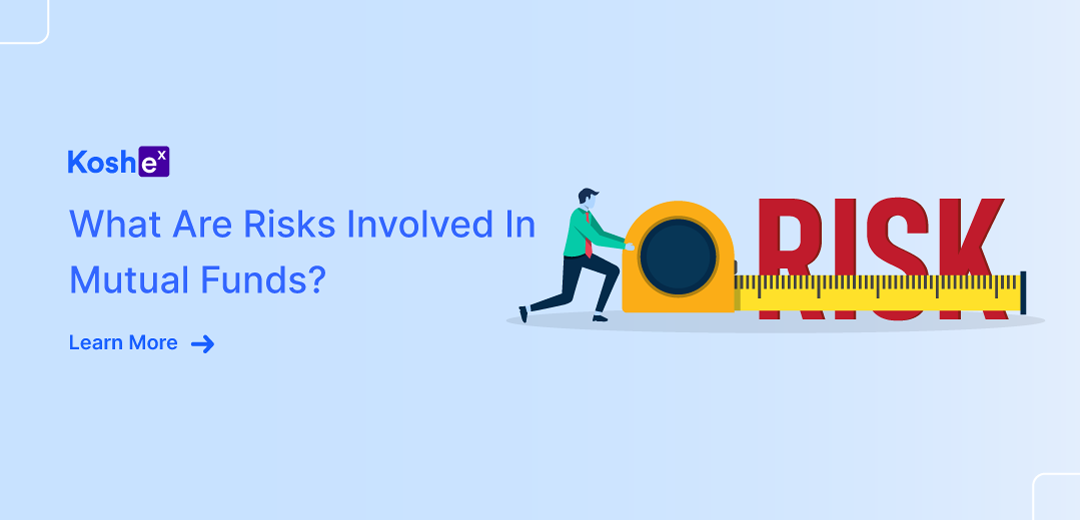Starting your mutual fund investment journey needs a good grasp of the market and being smart about risks. This quick guide aims to make mutual funds easier to understand, giving insights into possible market risks, inflation, liquidity, credit, and systematic risks. With practical tips, investors can wisely protect and enhance their mutual fund investments. Whether you’re new or experienced, this guide, along with Koshex’s helpful platform, gives you the knowledge and tools for a strong and successful investment journey.
Market Risks: Navigating Volatility
Mutual fund investors face constant challenges due to the unpredictable nature of stock values, which are prone to market risks. To manage these risks, investors need to have a comprehensive understanding of market dynamics. By examining historical data and market trends, investors can gain insights that will help them make informed and strategic decisions.
Understanding Market Risks
Market risks, arising from unpredictable shifts in stock values, directly affect mutual funds. Successfully navigating these risks involves leveraging historical data analysis and embracing diversification across various sectors. By strategically spreading investments, investors can minimize the adverse impact of market fluctuations, fostering the creation of a balanced portfolio. This proactive approach empowers investors to align their financial strategies with market dynamics, enhancing the resilience of their mutual fund investments in the face of uncertainties.
Diversification as a Risk Management Tool
Diversification serves as a shield against the inherent volatility of the market, promoting stability in the face of uncertainties. It allows investors to harness the potential for growth while strategically mitigating the impact of adverse market movements. Embracing diversification as a risk management tool is a prudent approach for those seeking to navigate the complexities of market risks and build a robust investment portfolio.
Inflation Risks: Preserving Your Purchasing Power
Inflation risks pose a threat to the purchasing power of investments over time. As the prices of goods and services increase, the real value of money diminishes. To counter this, investors need to consider investment avenues that offer returns surpassing the inflation rate.
Opting Equity Mutual Funds For Inflation-Beating Returns
Inflation erodes returns over time, making it crucial to opt for investments that historically outperform inflation. Equity mutual funds stand out as a strategic choice, offering long-term growth potential and effective wealth preservation. By primarily investing in stocks, these funds have demonstrated a historical track record of outpacing inflation over extended periods.
Choosing equity mutual funds aligns with a proactive approach to safeguarding the purchasing power of investments, ensuring that the value grows or remains resilient in the face of inflationary pressures. Investors can harness the dual benefits of capital appreciation and wealth preservation by incorporating equity mutual funds into their portfolios. By opting for equity funds, investors aim to not only shield their purchasing power but also foster wealth accumulation that keeps pace with or exceeds inflationary trends.
Liquidity Risks: The Importance of Easy Access to Funds
Liquidity risks pose challenges related to the swift conversion of mutual fund shares into cash without significant losses. Some funds may have redemption restrictions or specific holding periods, impacting quick fund access. Investors must carefully assess liquidity terms before committing to a mutual fund.
Opting for Open-Ended Mutual Funds
To minimize liquidity risks, consider investing in open-ended mutual funds. These funds provide flexibility, allowing investors to buy and sell shares at any time. Open-ended funds offer greater liquidity, ensuring investors can access their funds promptly, aligning with evolving financial needs and market conditions. Choosing open-ended mutual funds contributes to a more adaptable and responsive investment strategy.
Credit Risks: Evaluating Debt Instruments
Credit risks in mutual funds arise from investments in debt instruments issued by various entities, including companies and governments. The risk is linked to the creditworthiness of the issuer, and in the event of default, investors may face potential losses. Thoroughly researching the credit ratings assigned to different debt instruments within a mutual fund portfolio is crucial.
Higher-rated securities are generally considered less risky, and diversifying investments across various issuers and sectors helps reduce exposure to the risk of default by any one specific issuer. By adopting a diligent approach to credit risk evaluation, investors can make informed decisions and strategically manage their mutual fund portfolios.
Systematic Risks: Addressing Macro-Level Factors
Systematic risks, also known as market risks, are inherent factors that affect the overall market and influence all investments. These risks include events such as geopolitical changes, economic downturns, natural disasters, or regulatory shifts, impacting investment portfolios collectively. While systematic risks cannot be completely eliminated, investors can navigate them effectively by staying informed about macro-level factors.
Regularly monitoring economic indicators, geopolitical events, and regulatory changes allows investors to adapt their strategies to evolving market conditions. Maintaining a long-term perspective further helps in weathering short-term fluctuations caused by systematic risks, contributing to a resilient and well-informed investment approach.
Staying Informed and Adapting to Market Conditions
Continuous awareness of macro-level factors helps in adapting your investment strategy to systemic risks. Long-term planning helps endure short-term market fluctuations.
Conclusion
In conclusion, investing in mutual funds involves inherent risks, ranging from market and inflation risks to liquidity, credit, and systematic risks. However, armed with insightful strategies, investors can safeguard their investments and also optimize their portfolios for growth. Koshex stands as a reliable ally in this journey, offering a self-service platform equipped with personalized insights. By signing up with Koshex, investors gain access to a powerful tool that empowers them to navigate the complexities of the market, make informed decisions, and achieve financial success. Embrace the potential of strategic investing with Koshex for a secure and rewarding financial future.
FAQs:
- What makes a savings plan ‘smart,’ and how can Koshex help in crafting one?
A smart savings plan involves diversification, risk management, and long-term growth potential. Koshex’s personalized insights and tools empower you to craft a tailored savings plan aligning with your financial objectives.
What is the ideal investment horizon for equity mutual funds?
Equity mutual funds are suitable for long-term investments, ideally five to ten years or more. A longer horizon increases the potential for capital appreciation while mitigating short-term market volatility.









Leave a Comment